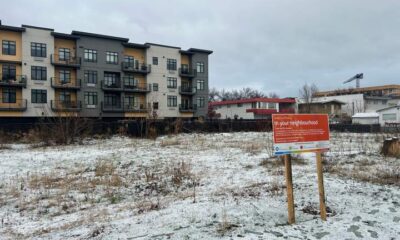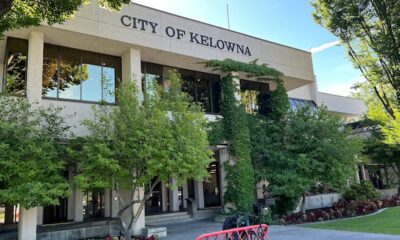Top Stories
Kelowna Unveils AI Chatbot to Transform Housing Permits

UPDATE: The City of Kelowna has launched a game-changing AI chatbot named KAI, aimed at revolutionizing the zoning and permitting process for homeowners. This innovative tool allows residents to bypass lengthy bylaws, streamlining applications and saving valuable time. The launch comes after extensive collaboration with Microsoft and a significant investment of $350,000 from the city, which Microsoft matched extensively.
In a statement, Kelowna’s planning director, Ryan Smith, emphasized the urgency of this development, stating, “It is really the future when it comes to housing and permitting processes in a lot of fast-growing cities.” The chatbot was developed in 2021, well before the public release of ChatGPT, highlighting Kelowna’s proactive stance in leveraging AI technology.
The AI tool can answer common questions about zoning and guide users through the application process, a necessity for homeowners who previously had to sift through up to 400 pages of regulations. As part of their commitment to transparency, Smith and other officials presented their findings at the Union of B.C. Municipalities (UBCM) conference in late September, where they also addressed emerging security and privacy concerns.
A recent survey by KPMG revealed that 48% of Canadian government workers are now using AI tools, with half relying on publicly available platforms. This trend raises significant questions about data security and the risk of biased information. Kelowna’s approach emphasizes hands-on experience with AI, in contrast to Vancouver’s more cautious, top-down method, which includes rigorous privacy impact assessments.
Smith admitted to initial frustrations with the AI system’s learning curve. “You needed people behind the scenes helping it,” he noted, underscoring the importance of ongoing training and oversight. The city has implemented a review process to ensure KAI provides accurate information and has successfully refined its capabilities to answer basic planning questions.
As Kelowna pushes ahead with its AI initiatives, the city is also exploring advanced mapping programs to predict redevelopment potential and future growth. However, some ideas have been shelved due to lack of usage, demonstrating a practical approach to innovation.
The question of data security remains paramount. Smith acknowledged that Kelowna’s development of AI tools preceded thorough privacy assessments, stating, “We were doing it before we were doing privacy impact assessments.” The city took precautions by isolating KAI from the open internet, ensuring it learns only from curated data.
Conversely, Vancouver’s AI strategy is driven by specific objectives, according to Aman Sidhu, the city’s director of enterprise data. Vancouver’s efforts include projects such as a situational awareness engine for the upcoming FIFA World Cup and a flood mapping initiative developed in partnership with the federal government. Vancouver currently has 21 AI products in use or development, following a stringent privacy-first approach.
Local leaders from smaller communities expressed a desire to adopt AI technologies but face constraints in resources and expertise. Jeff Murl from Whistler articulated the challenge, saying, “How do we get some of what you’ve got going on?” His plea reflects a broader need for accessibility to AI innovations among municipalities with limited budgets.
Experts like Terri Griffith advocate for a balanced approach to AI implementation, emphasizing the necessity of building basic AI competence within organizations. She warns that rapid technological adoption often outpaces regulatory frameworks, resulting in potential security oversights.
As local governments navigate the complexities of AI integration, the conversation around privacy and innovation continues to evolve. Kelowna and Vancouver’s approaches highlight the diverse strategies municipalities are employing to harness AI’s potential while addressing the critical issue of data security.
Residents and local governments alike are eagerly watching these developments, which could set a precedent for how cities across Canada utilize AI to enhance services and streamline processes in the face of rapid growth and technological change.
-

 Politics4 weeks ago
Politics4 weeks agoSecwepemc First Nation Seeks Aboriginal Title Over Kamloops Area
-

 World5 months ago
World5 months agoScientists Unearth Ancient Antarctic Ice to Unlock Climate Secrets
-

 Entertainment5 months ago
Entertainment5 months agoTrump and McCormick to Announce $70 Billion Energy Investments
-

 Science5 months ago
Science5 months agoFour Astronauts Return to Earth After International Space Station Mission
-

 Lifestyle5 months ago
Lifestyle5 months agoTransLink Launches Food Truck Program to Boost Revenue in Vancouver
-

 Technology3 months ago
Technology3 months agoApple Notes Enhances Functionality with Markdown Support in macOS 26
-

 Lifestyle3 months ago
Lifestyle3 months agoManitoba’s Burger Champion Shines Again Amid Dining Innovations
-

 Top Stories2 months ago
Top Stories2 months agoUrgent Update: Fatal Crash on Highway 99 Claims Life of Pitt Meadows Man
-

 Politics4 months ago
Politics4 months agoUkrainian Tennis Star Elina Svitolina Faces Death Threats Online
-

 Sports5 months ago
Sports5 months agoSearch Underway for Missing Hunter Amid Hokkaido Bear Emergency
-

 Politics5 months ago
Politics5 months agoCarney Engages First Nations Leaders at Development Law Summit
-

 Technology5 months ago
Technology5 months agoFrosthaven Launches Early Access on July 31, 2025




















